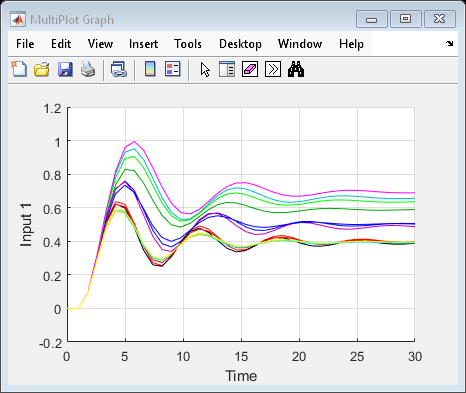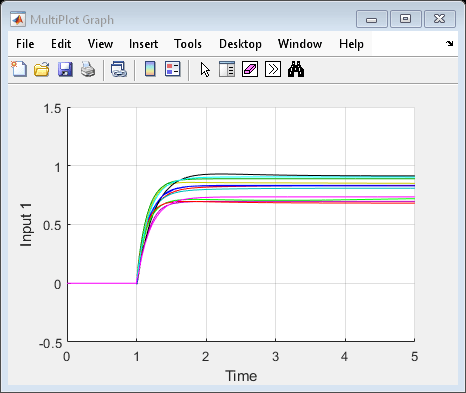Uncertain State Space
Simulate uncertain system in Simulink
Libraries:
Robust Control Toolbox
Description
The Uncertain State Space block lets you model parametric and dynamic uncertainty in
Simulink®. The block accepts uncertain state space (uss) models or any model that can be converted to uss, such as
umat, ureal, umargin, and
ultidyn objects.
Examples
Simulate Uncertain Model at Sampled Parameter Values
Simulate an uncertain model in Simulink® using the Uncertain State Space block. You can sample uncertain parameters at specified values or generate random samples. The MultiPlot Graph block lets you visualize the responses of multiple samples on the same plot.
Vary Uncertain Values Across Multiple Uncertain Blocks
For models with a large number of uncertain variables or multiple Uncertain State Space blocks, you can vary multiple uncertainty values simultaneously.
Ports
Input
For a single-input uncertain system, the input signal is a scalar. For multiple-input systems, combine the system inputs into a vector signal, using blocks such as:
Mux (Simulink)
Vector Concatenate (Simulink)
Bus Creator (Simulink)
Output
For a single-output uncertain system, the output signal is a scalar. For multiple-output systems, the output signal is a vector. To split system outputs into scalar signals, use blocks such as:
Demux (Simulink)
Bus Selector (Simulink)
Parameters
Specify the uncertain model to simulate as uss object using one
of the following:
Function or expression that evaluates to an
ussobject. For example:ss(ureal('a',-5),5,1,1)wt*input_unc, whereinput_uncis anultidynobject andwtandinput_uncare defined in the MATLAB® workspace.
Variable defined in the MATLAB workspace. For example,
unc_sys, where you defineunc_sys=ss(ureal('a',-5),5,1,1)in the workspace.Model of any type that can be converted to a
ussmodel object. For example:LTI models (
tf,zpkandss)Uncertain matrix (
umat)Uncertain real parameters (
ureal)Uncertain dynamics (
ultidyn,umargin)
When the block is in a model with synchronous state control (see the State Control (HDL Coder) block), you must specify a discrete-time model.
Programmatic Use
Block Parameter:
USystem |
Type:
uss model, model that can be converted to
uss |
Default:
ss(ureal('a',-5),5,1,1) |
The uss model that you specify in the Uncertain system variable (uss) parameter depends on uncertain variables
such as ureal or ultidyn uncertainty. To
simulate or linearize the uncertain model, the block must replace these uncertain
variables with fixed values. Use this parameter to specify those fixed values for the
next simulation or linearization. Use a structure whose fields are the names of the
uncertain elements in the uss model and whose values are the substitute
values of those elements. For example:
If the
ussmodel has uncertain real (ureal) parameters with namesaandb, then setting this parameter tostruct('a',1,'b',3.5)replacesawith 1bwith 3.5.If the
ussmodel has dynamic uncertainty represented by aultidynelement named'delta', then setting this parameter tostruct('delta',tf(1,[1 1]))replaces the uncertain dynamics with the specified transfer function.
To generate randomized values of uncertain variables for Monte Carlo simulation, use
ufind and usample, as shown in the examples
Simulate Uncertain Model at Sampled Parameter Values and
Vary Uncertain Values Across Multiple Uncertain Blocks.
The default value [] sets all uncertain elements to their nominal
values. Note that the nominal value of ultidyn uncertain dynamics is
always 0, and the nominal value of umargin gain and phase uncertainty
is always 1.
Programmatic Use
Block Parameter:
UValue |
| Type: structure |
Default:
[] |
If the nominal value of the uncertain system you specify in the Uncertain
system variable (uss) parameter has dynamics, you can use this parameter to
specify initial values for those states. Specify the initial states as a vector having
as many entries as there are states. The default value of []
initializes all states to 0.
Programmatic Use
Block Parameter:
X0 |
| Type: scalar, vector |
Default:
[] |
If the uncertain system contains some dynamic uncertainty
(ultidyn or umargin), then you can use the
Uncertainty value (struct or [] to use nominal value) parameter
to replace that uncertainty with specific dynamics for simulation. Use the
Initial states (uncertain dynamics) parameter to specify the
initial state of these dynamics. Specify the initial states as a vector having as many
entries as there are states. The default value of [] initializes all
states to 0.
Programmatic Use
Block Parameter:
uX0 |
| Type: scalar, vector |
Default:
[] |
Version History
Introduced in R2009b
MATLAB Command
You clicked a link that corresponds to this MATLAB command:
Run the command by entering it in the MATLAB Command Window. Web browsers do not support MATLAB commands.
选择网站
选择网站以获取翻译的可用内容,以及查看当地活动和优惠。根据您的位置,我们建议您选择:。
您也可以从以下列表中选择网站:
如何获得最佳网站性能
选择中国网站(中文或英文)以获得最佳网站性能。其他 MathWorks 国家/地区网站并未针对您所在位置的访问进行优化。
美洲
- América Latina (Español)
- Canada (English)
- United States (English)
欧洲
- Belgium (English)
- Denmark (English)
- Deutschland (Deutsch)
- España (Español)
- Finland (English)
- France (Français)
- Ireland (English)
- Italia (Italiano)
- Luxembourg (English)
- Netherlands (English)
- Norway (English)
- Österreich (Deutsch)
- Portugal (English)
- Sweden (English)
- Switzerland
- United Kingdom (English)


